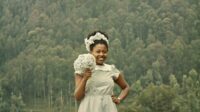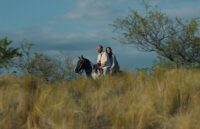A gloriously sun-dappled slice of 1970s sports comedy, the not-yet-completely-forgotten Skateboard is back on the big screen, thanks to the restoration work of Factory 25, and its adolescent charms well outweigh some clumsy flubs and falls. The script may be run of the mill and the plot a trove of genre tropes, but it’s nonetheless impossible to watch this joyous little gem without a smile, especially as it builds up speed towards its big-race climax with all the big money riding on little Leif Garrett careening down the track.
Back in 1978, Skateboard was the first feature film to capitalize on the decade’s skateboard craze. The paving of the suburbs meant asphalt everywhere, and kids across the country took to the parking lots and concrete pathways to glide and clack about on their boards. It wasn’t just the O.C.—boarding was a coast-to-coast-and-everywhere-in-between phenomenon—but Californians took to it with a special zeal. Kids on boards, feet dirty and long hair flying, became the bane of middle-class motorists, moms, pops, and cops. With their ollies, shove-its, and kickflips, the kids were giving the proverbial middle finger to their elders, finding freedom in flight and rebellion.
Skateboard merges this 1970s subculture with a Bad News Bears-style storyline, a cheerfully subversive underdog tale. Low-rent Hollywood agent Manny Bloom (played by the perpetually exasperated Alan Garfield) is down on his luck, in debt to bookie Sol (Antony Carbone) to the tune of ten grand he has no way to earn. At least until he comes up with what would seem, on the surface, like the worst moneymaking idea ever: he’s going to make a professional team of those skateboard kids doing tricks every morning in his neighborhood. The way Manny figures it, if his makeshift team of teens can earn a payday, he can get Sol and his strongman off his back.
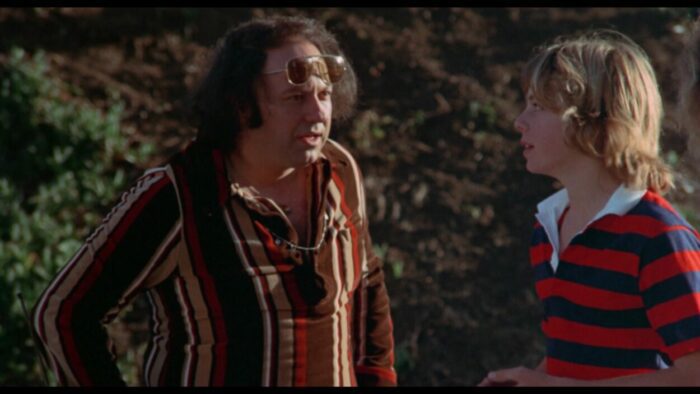
The local kids are game for the ride, a talented bunch, but hardly professional in their work ethic. Hormones get in the way, as do some typically adolescent hijinks and crises of confidence. Manny has his work cut out for him in melding a team—and a new sport—from his ragtag crew. But, he develops, despite his gruff demeanor, some affection for the kids and an appreciation for their considerable athletic skills, which Skateboard is keen to show off.
Nearly everything about Skateboard, says director and co-writer George Gage, was done quick. “Harry Blum gave us about 90 days from start to finish, from script to cast to shoot to post,” he recalls. “Dick Wolf and I put the script together in less than a month while casting.” Richard Dreyfuss and Paula Prentiss were considered for the adult leads before Garfield and Kathleen Lloyd came aboard. Orson Bean just happened to be hanging out and watching the spectacle of the production, agreeing on the spot to appear as himself in a cameo. For the supporting cast Gage, who lived in Malibu at the time, looked to the actors he had known from his work doing commercials—and to the local skateboard haunts for the teens who would comprise the L.A. Wheels.
The cast of kids includes skateboarding Hall of Famers Ellen O’Neal, the “Wonder Woman of Freestyle Skateboarding” who competed for World Championships, and Tony Alva, one of the most influential skateboarders of all time and one of the founding members of the legendary Zephyr (Z-Boys of Dogtown) team, both of whom are perfectly credible in their speaking lines as well as on their boards. Locals Pam Kenneally and Richard Van der Wyk, both of whom were aspiring actors comfortable on skateboards, had enough camera experience to play the film’s teen romance.
Tiger Beat teen idol Leif Garret had already had a handful of hit records by age 16 when production began and stars here in his first film role, even doing his own stunts. When the team’s star takes a powder just before the big championship showdown, it’s up to Garret’s Brad to step up and take his place in the mile-long downhill race that will make the Wheels, and manager Manny, winners or losers.
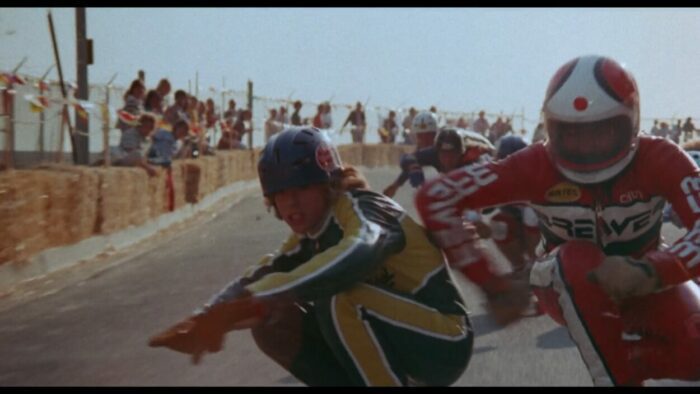
Part of the joy of watching Skateboard is simply the enjoyment of watching beautiful young blond teens soar through the air on the boards. From its opening moments to its climactic final showdown, Skateboard does not disappoint. All of the action is shot with the primary cast, few stunt doubles, and no special effects beyond simple edits. Gage, directing his first feature film (before turning to his long and esteemed career in humanitarian documentary filmmaking), focuses on the sport’s poetry in motion, getting close to the ground as the skateboarders soar in the sky, letting the athletes perform without relying on the camera to do the tricks.
The climactic sequence will have you up and out of your seat as Garrett’s character races downhill, little to no protective gear, against grown men who outweigh him by 50 pounds who jostle back and forth jockeying for position. “Leif wanted to earn their respect,” Gage recalls of the teen actor and the other, fully grown professional boarders employed as extras in the final sequence. “And he did.” With the final set piece shot documentary-style, in close to real time as the racers descended a mile-long hill, getting the right shot at the right time was crucial. It almost didn’t happen, as two of Gage’s assistant cinematographers came up short on usable footage. But you won’t be able to tell from the final product: the final race is as convincing as they come.
Gage co-wrote the film with Dick Wolf, who would go on to great fame with the Law & Order television franchise. Also on the set was a young Gus Van Sant in his first film job as a production assistant. The talent on hand doesn’t necessarily make Skateboard a great sports film: it’s not as memorable as The Bad New Bears, as inspiring as Rocky, as subversive as Slap Shot, or as funny as Caddyshack. At times the dialogue will grind to an uncomfortable halt before the teens thankfully get back on their boards. But they always do, and that’s where Skateboard’s at its best and where Gage’s direction, honed by years of commercial direction and cinematography, shines through.
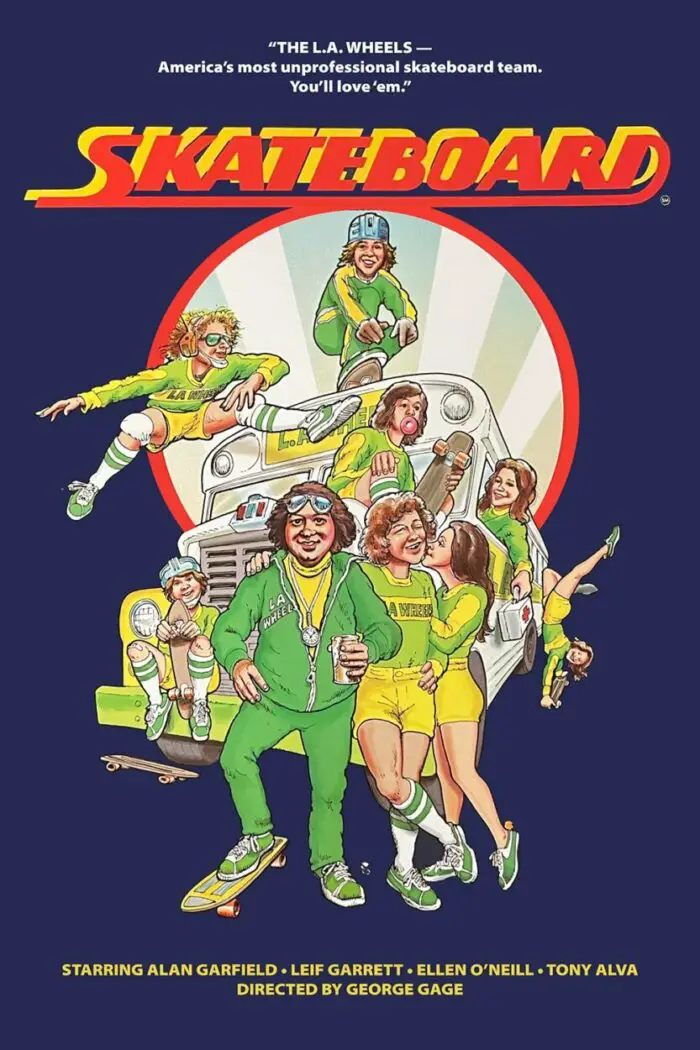
When it was originally released, Gage recalls, it was slated by Universal for a big opening, some 87 theaters in L.A. alone. At least until the juggernaut that was Animal House came along, and suddenly those 80-plus screens turned into a dozen or so. Reviews were mixed, box office negligible; for that matter, Skateboard is also a film that not many have seen since its too-brief theatrical run.
It’s never seen a Blu-ray release, and DVDs are long out of print. Only a single, beat-up 16mm print was thought to exist before Factory 25’s Matt Grady located a 35mm print from which to work to restore and replicate Skateboard digitally. This new version is a sight to behold: Skateboard‘s Hall-of-Fame performers, gripping action, and low-key charms make for a sunny slice of ’70s Americana, a pleasant 90 minutes’ worth of light teen comedy and smart skateboarding skills to enjoy once again on the big screen.
Skateboard (1978), directed by George Gage, starring Alan Garfield, Leif Garrett, Tony and Ellen O’Neal, is playing at theaters across the U.S. in October and November. See Factory 25 for screening dates.


